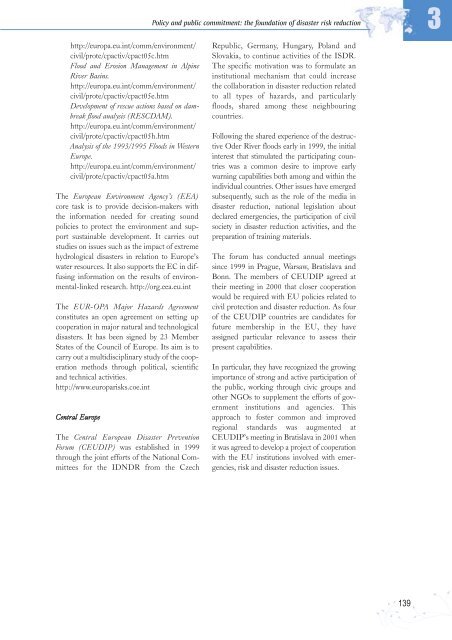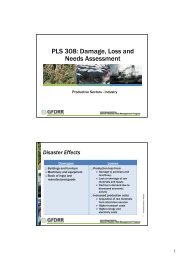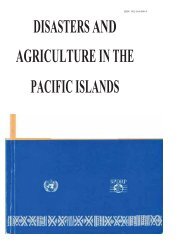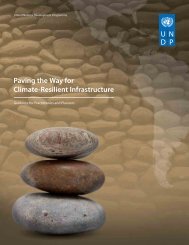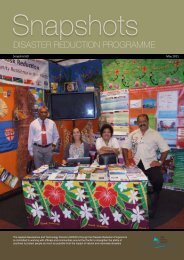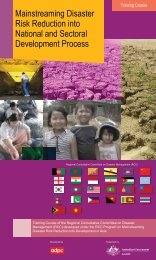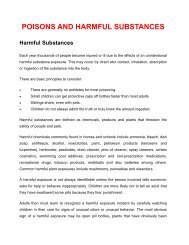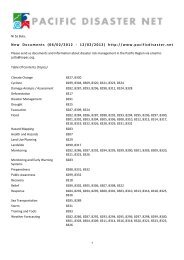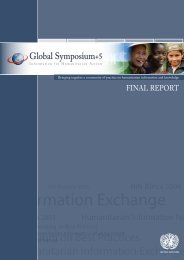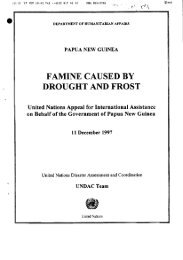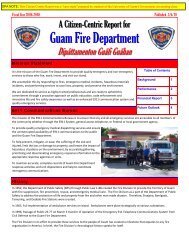A global review of disaster reduction initiatives - Welcome to the ...
A global review of disaster reduction initiatives - Welcome to the ...
A global review of disaster reduction initiatives - Welcome to the ...
You also want an ePaper? Increase the reach of your titles
YUMPU automatically turns print PDFs into web optimized ePapers that Google loves.
http://europa.eu.int/comm/environment/civil/prote/cpactiv/cpact05c.htmFlood and Erosion Management in AlpineRiver Basins.http://europa.eu.int/comm/environment/civil/prote/cpactiv/cpact05e.htmDevelopment <strong>of</strong> rescue actions based on dambreakflood analysis (RESCDAM).http://europa.eu.int/comm/environment/civil/prote/cpactiv/cpact05h.htmAnalysis <strong>of</strong> <strong>the</strong> 1993/1995 Floods in WesternEurope.http://europa.eu.int/comm/environment/civil/prote/cpactiv/cpact05a.htmThe European Environment Agency’s (EEA)core task is <strong>to</strong> provide decision-makers with<strong>the</strong> information needed for creating soundpolicies <strong>to</strong> protect <strong>the</strong> environment and supportsustainable development. It carries outstudies on issues such as <strong>the</strong> impact <strong>of</strong> extremehydrological <strong>disaster</strong>s in relation <strong>to</strong> Europe’swater resources. It also supports <strong>the</strong> EC in diffusinginformation on <strong>the</strong> results <strong>of</strong> environmental-linkedresearch. http://org.eea.eu.intThe EUR-OPA Major Hazards Agreementconstitutes an open agreement on setting upcooperation in major natural and technological<strong>disaster</strong>s. It has been signed by 23 MemberStates <strong>of</strong> <strong>the</strong> Council <strong>of</strong> Europe. Its aim is <strong>to</strong>carry out a multidisciplinary study <strong>of</strong> <strong>the</strong> cooperationmethods through political, scientificand technical activities.http://www.europarisks.coe.intCentral EuropeThe Central European Disaster PreventionForum (CEUDIP) was established in 1999through <strong>the</strong> joint efforts <strong>of</strong> <strong>the</strong> National Committeesfor <strong>the</strong> IDNDR from <strong>the</strong> CzechPolicy and public commitment: <strong>the</strong> foundation <strong>of</strong> <strong>disaster</strong> risk <strong>reduction</strong>Republic, Germany, Hungary, Poland andSlovakia, <strong>to</strong> continue activities <strong>of</strong> <strong>the</strong> ISDR.The specific motivation was <strong>to</strong> formulate aninstitutional mechanism that could increase<strong>the</strong> collaboration in <strong>disaster</strong> <strong>reduction</strong> related<strong>to</strong> all types <strong>of</strong> hazards, and particularlyfloods, shared among <strong>the</strong>se neighbouringcountries.Following <strong>the</strong> shared experience <strong>of</strong> <strong>the</strong> destructiveOder River floods early in 1999, <strong>the</strong> initialinterest that stimulated <strong>the</strong> participating countrieswas a common desire <strong>to</strong> improve earlywarning capabilities both among and within <strong>the</strong>individual countries. O<strong>the</strong>r issues have emergedsubsequently, such as <strong>the</strong> role <strong>of</strong> <strong>the</strong> media in<strong>disaster</strong> <strong>reduction</strong>, national legislation aboutdeclared emergencies, <strong>the</strong> participation <strong>of</strong> civilsociety in <strong>disaster</strong> <strong>reduction</strong> activities, and <strong>the</strong>preparation <strong>of</strong> training materials.The forum has conducted annual meetingssince 1999 in Prague, Warsaw, Bratislava andBonn. The members <strong>of</strong> CEUDIP agreed at<strong>the</strong>ir meeting in 2000 that closer cooperationwould be required with EU policies related <strong>to</strong>civil protection and <strong>disaster</strong> <strong>reduction</strong>. As four<strong>of</strong> <strong>the</strong> CEUDIP countries are candidates forfuture membership in <strong>the</strong> EU, <strong>the</strong>y haveassigned particular relevance <strong>to</strong> assess <strong>the</strong>irpresent capabilities.In particular, <strong>the</strong>y have recognized <strong>the</strong> growingimportance <strong>of</strong> strong and active participation <strong>of</strong><strong>the</strong> public, working through civic groups ando<strong>the</strong>r NGOs <strong>to</strong> supplement <strong>the</strong> efforts <strong>of</strong> governmentinstitutions and agencies. Thisapproach <strong>to</strong> foster common and improvedregional standards was augmented atCEUDIP’s meeting in Bratislava in 2001 whenit was agreed <strong>to</strong> develop a project <strong>of</strong> cooperationwith <strong>the</strong> EU institutions involved with emergencies,risk and <strong>disaster</strong> <strong>reduction</strong> issues.3139


